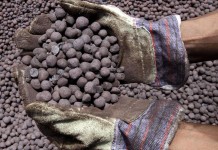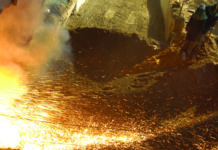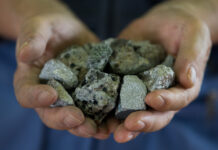
[miningmx.com] – A RELUCTANCE to be exposed to local electricity charges, the importance of having business ties with Sumitomo Corporation and China Steel Corporation, and a recognition there were certain minerals unsuited to beneficiation were key factors in African Rainbow Minerals (ARM’s) decision to build a $328m ferromanganese smelter in Malaysia, the group said.
Miningmx reported on June 19 that ARM was to join a joint venture with the Chinese and Japanese steelmakers to build a 169,000 tonne/year ferromanganese smelter in Malayasia’s Sarawak state that would be controversially supplied with manganese ore from South Africa.
Miningmx noted at the time this seemed to run counter to the South African government’s beneficiation strategy which is aimed at adding value to minerals mined in the country rather than exporting them.
ARM’s executive chairman, Patrice Motsepe, and Jan Steenkamp, head of ARM’s exploration and technical services, said however there were business and strategic reasons for locating the smelter in Malaysia, not least of which was the relatively cheap supply of electricity from a hydroelectric installation.
Encouragingly, Steenkamp said ARM had discussed beneficiation with the South African government some 18 months before announcing building of the smelter project called “Sakura’ (a Japanese flower); encouraging, because it shows there is some flex in the government’s hitherto hardline stance to beneficiation.
“We had taken it [beneficiation] up with government about one-and-a-half years ago, not specifically Sakura,” said Steenkamp. “But we looked at definition of beneficiation and where we could work together,” he said.
It seems the South African government was persuaded by ARM’s view that exporting manganese ore offshore was a means of protecting and even growing jobs at its local manganese mines which were already under a margin squeeze.
Steenkamp added that the group was looking at other initiatives, not in the public domain, in which ARM could improve its margins. “We’re not walking away from beneficiation, but creating an opportunity whilst we look at beneficiation that is closer to source,’ he said.
ARM also couldn’t afford to pass up on the opportunity of joining with Sumitomo and China Steel, whilst adding that beneficiation made sense for certain minerals.
“We have to maintain these partnerships with two of the most important companies in the world. If didn’t partner with them it would not have been in our best interests in terms of what doing in South Africa,’ said Motsepe.
“We will continue to make resources available for beneficiation. It may be certain commodities should not . let me put it in a more positive sense,’ said Motsepe stopping himself before re-phrasing: “. some commodities can be more easily beneficiated in southern Africa.
“At the heart of beneficiation long term is global competitivness and profitability,’ he said, adding that electricity “. continues to be an issue . The cost of electricity in Malaysia is extremely cheap compared with South Africa’.
The Sakura investment will be through a consortium in which China Steel will take a 19% stake and Japan’s Sumitomo a 27% interest. The balance is held through Assmang which ARM controls in a 50:50 joint venture with Assore, the Sacco family company.
In terms of the proposal, Assmang will sell 300,000 tonnes of manganese ore mined in South Africa to the project, presumably at market prices. China Steel has the right to buy between 31,000 to 32,000 tonnes of ferromanganese from the project.
The cheap power supply means the ferromanganese will be produced some 20% to 30% cheaper than Assmang’s South African smelters and therefore operate in the bottom half of ferromanganese cost curve of less than $800/t.











